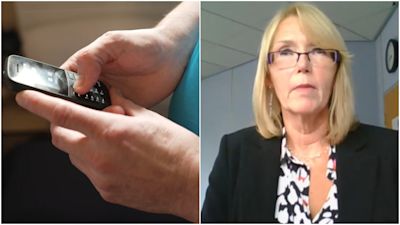Scottish prisoners face 'punishment or withdrawal' after hacking tamper-proof phones for drugs

Scottish Prison Service's chief executive: When phones have been tampered with prisoners will face "punishment and/or withdrawal"
Scottish prisoners who tampered with phones given to them during Covid lockdown to buy drugs and engage in other criminal activity will face “punishment and/or withdrawal”, the head of Scottish Prison Service has warned. An ITV News exclusive investigation revealed that ‘unhackable’ mobile phones given to inmates during the Covid lockdown by the Scottish Government to contact friends and family were almost immediately hacked at Scotland's largest prison, Barlinnie.
The Scottish Prison Service (SPS) said 728 phones have been found since August 2020 to operate with illegal SIM cards, used for drug deals and other criminal activity.
ITV News' revelations were cited by Members of the Scottish Parliament (MSPs) both in the Holyrood chamber and in the Criminal Justice Committee on Wednesday.
The interim chief executive of the SPS told the Criminal Justice Committee the inmates found to have tampered with mobile phones will face the full force of the law. Teresa Medhurst said: “Where those phones have been tampered with, then there are arrangements to ensure that we apply whatever an appropriate degree of punishment and/or withdrawal, depending on the circumstances in which that the nature of the tampering has occurred.”
Russell Findlay MSP cites ITV News' prison investigation at the Criminal Justice Committee
Russell Findlay MSP said he had spoken directly to ITV News' Scotland Correspondent Peter Smith who informed him that prisoners were smuggling in seals which allow them to tamper with the phone and reseal it, which means on inspection staff have no way of knowing it has been tampered with.
Ms Medhurst said she did not have information on the number of phones that have been compromised.
"The availability of different means and methods of serious organised crime infiltrating not just our country but our prisons are clearly significant and that's why we have such close relationship with colleagues in Police Scotland, and work with them really intensively around some of the threats and vulnerabilities that that poses," she said.
Inside Barlinnie: Peter Smith goes inside Scotland's biggest prison and given exclusive access to how it's tackling the problem of inmates struggling with addiction
Ms Medhurst said going forward the “risks will be minimised” and “additional measures put in place” – both internal security measures and technological solutions. Ms Medhurst said the phones were introduced in prisons a year ago and the prison service has continually looked to identify where “the vulnerabilities lie and seek technology solutions to minimise those vulnerabilities.” The prison service was working with the Scottish Government to decide whether the use of mobile phones in prisons would continue or whether a more “technologically focused” approach would be taken instead.
“This has been a learning process for us as we've experienced it over the last year, and much of that learning will now be used to inform how best we take the next steps forward as an organisation, and we will do that in conjunction with Scottish Government colleagues,” Ms Medhurst added. She explained the mobile phones were introduced in prisons within four months when it was “uncertain” when families would be able to visit prisoners in custody – describing the situation as “unusual” and “unprecedented”.
Ms Medhurst said: “We needed to identify at pace other means people could maintain family contact, not just to ensure families who were incredibly concerned and scared for the well-being of their loves ones in custody could be reassured, but the mental health of those in custody as well.”
ITV News’ prison investigation was also raised at Holyrood on Wednesday by several MSPs. The investigation found that prisoners were using ever more complex and covert methods to smuggle in drugs, including legal letters soaked in drugs.
Mr Findlay said several weeks ago he had asked Scotland’s Justice Secretary Keith Brown to consider photocopying the letters rather than allowing the original letters into the prison to stem this flow, and asked what had been done about that.
Russell Findlay MSP asks whether letters can be photocopied instead of allowing the originals, which might be soaked in drugs, into prisons
Mr Brown said: "It's a complex area, it's one that was known to the prison service and they are looking at this now and officials that were either present at the committee meeting which the member refers to or have listened to our undertaking examination of that proposal.
"It was a constructive proposal and I take it in that spirit, and I would ask the member to give us the time to look at that seriously and come back to him."
Conservative MSP Tess White asks the Scottish Government what immediate action is being taken to discipline the prisoners and prevent the criminal activity on the prison estate
Tess White, Conservative MSP for North East Scotland, asked what immediate punishment the prisoners were going to face and how this criminal activity would be prevented in future. In response, Scotland’s Justice Secretary Keith Brown said: “The member will know or should know that the issue of prisoners being disciplined is one for the Scottish prison service, they take that decision.” He added: “The benefits of the phones you've mentioned quite rightly, one of the issues with the phones in terms of being tampered, the benefits have being huge in relation to managing prison services, which have not been able to operate in the way that they have in the past.”